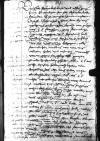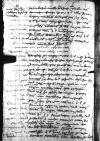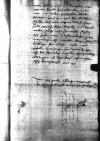Es ist unnsser camermaister ⌊Cristoff Gattennhofen⌋ heut dato bey uns widerumb ankomen, des bericht wir gnugsam, was E(ur) L(ieb) betreffent, / gantz freuntlicher maynung angehort und verstand(en) hab(en). Wollenn uns auch darin und sond(er)lich was die coadiutoria belangent, / alles freuntlichen willens, wie wir uns erbotten, halten und erzaig(en), wiewoll wir unssernn furschlag uff gewisen grundt zu handeln gestelt, sollen E(ur) L(ieb) doch nicht darfur halten, alss thetten wir derselbigen des oder ainss andern nicht glauben, sonder wissen, das uns E(ur) L(ieb) nichts ungleichs berichten werden. Darumb so wollet E(ur) L(ieb) sich unssers furschlags nicht beschweren lassen, wir wollen auch mit dem besten vleiss an ko(niglicher) m(aieste)t wie uns unsser ⌊camermaister⌋ bericht, schreiben und E(ur) L(ieb) vill lieber dan aine(n) andern zu einem nachparn hab(en), welichs Got der almechtig gnedigklich fug(en) und geben woll.
Was den ⌊Kosthken⌋ belangent, wollen wir vil lieber derjhenigen, die uns nachperlichen und freuntlichen willen erzaig(en) dan denen, so uns und denselbigen widerwertig sein, wid(er)umb  AAWO, AB, D.91, f. 84v freuntlichen willen zuerzaig(en), mer dan demselbigen erfunden werden on the margin⌈mer dan demselbigen erfunden werdenmer dan demselbigen erfunden werden on the margin⌉, wollen uns derwegen hierzu geig(en) E(ur) L(ieb) alles freuntlichen willens beweiss(en), des sich dan E(ur) L(ieb) zu uns versehen sollen. / Thon uns auch des erbiettens, so uns unsser ⌊camermaister⌋ von E(ur) L(ieb) angezaigt, gantz freuntlich bedanck(en), das sich dan E(ur) L(ieb) widerumb auch nicht anderss vertrost(en) und verlassen soll etc.
AAWO, AB, D.91, f. 84v freuntlichen willen zuerzaig(en), mer dan demselbigen erfunden werden on the margin⌈mer dan demselbigen erfunden werdenmer dan demselbigen erfunden werden on the margin⌉, wollen uns derwegen hierzu geig(en) E(ur) L(ieb) alles freuntlichen willens beweiss(en), des sich dan E(ur) L(ieb) zu uns versehen sollen. / Thon uns auch des erbiettens, so uns unsser ⌊camermaister⌋ von E(ur) L(ieb) angezaigt, gantz freuntlich bedanck(en), das sich dan E(ur) L(ieb) widerumb auch nicht anderss vertrost(en) und verlassen soll etc.
Weitter, so wissen wir E(ur) L(ieb) nicht zu bergen, das diese brieffs zaiger ⌊pfaltzgraff Friderichs⌋ diener, ⌊Eblinger⌋ gnant, bey uns ankomen mit bericht, das sie E(ur) L(ieb) zur will bey ko(nigliche)n m(aieste)t gesuchet, aber nicht angetroff(en), dieweyl sie dan E(ur) L(ieb) yzundt besuchen thon und uns nicht zu wissen geburt, noch wissen wollen, / was / ire geschefft / und uns die Pfaltz dermassen zugethan, das wir derselbig(en) freuntschafft gerne sehen thon, / wo uns nu E(ur) L(ieb) so freuntlich erscheinen wolt / und was davon zu wissen vergonnen, / stellen wir zu E(ur) L(ieb) freuntlichem gefallen / und sonderlich so wolten wir ye geren / die Pfaltz von wegen der alt mutter her, die des koniglichen stam(m)es gewesen, welichen E(ur) L(ieb) auch hochlich gewogen, die wir freuntlich bitten befolhen sein lassen.
 AAWO, AB, D.91, f. 85r
AAWO, AB, D.91, f. 85r
Und wiewol man uns fur ainen lutterischen halten thut, so ist doch bey uns unvergessen der wolthat, so uns von ⌊bebstlicher heligkeyt⌋ uns und unssernn brudern margg(ra)f ⌊Wilhelm⌋ das bisthumb ⌊Osell⌋ belangent gescheen und bejegent. / Hoffen Got der almechtig werdt durch diese weg und mittell der sach gluckselligklich ratten und helffen, / wiewol der orden in ⌊Eifflandt⌋ etwas schwermuttig und das schloss ⌊Arnssbergk⌋ noch in des alten bischoffs handen, der wegen ⌊bebstlichen heiligkeyt⌋ / etliche breve, die wir gesehen, aussgeen haben lassen, darin bevolhen unsserm brudern das bisthumb abzutretten, auch dem capietell gebotten / unssern brudern fur ire bischof zu halten und zu schreib(en). Aber nichts dester weniger zu furderung d(er) sachen so thon wir E(ur) L(ieb) freuntlich bitten, E(ur) L(ieb) wollen an konigklichem hof auch bey ko(niglicher) m(aieste)t die sachen also helffen einfuren, / domit sich ko(niglichen) m(aieste)t mit schrifften und andern nicht clainmuttig, sond(er) grossmutig beweisen und erzaig(en), / wurdt der sach(en) sonder zweifell gross hilfflich erscheinen, / wie dan E(ur) L(ieb) zuthon wol werd(en) wissen. / Das hab(en) wir E(ur) L(ieb) fur neue zeittung freuntlicher maynung nicht wollen berg(en).
 AAWO, AB, D.91, f. 86r
AAWO, AB, D.91, f. 86r
Wir hetten auch E(ur) L(ieb) dits geren mit aigner handt zugeschrieben, so sein wir mit vilen geschefften beladen gewesen, / auch zum tayl der faulheit schuldt, das wir daran verhindert sindt word(en), / bitten derhalb(en) E(ur) L(ieb), dieselb wolten solichs nicht zu unwillen fassen, das haben wir E(ur) L(ieb) freuntlicher, guter maynung nicht wollen berg(en), dan d(er)selbigen freuntlichen willen und gefallen zu erzaigen sein wir zu thon alss des freuntlich nachbar gantz willig.
 AAWO, AB, D.91, f. 84v freuntlichen willen zuerzaig(en), mer dan demselbigen erfunden werden on the margin⌈mer dan demselbigen erfunden werdenmer dan demselbigen erfunden werden on the margin⌉, wollen uns derwegen hierzu geig(en) E(ur) L(ieb) alles freuntlichen willens beweiss(en), des sich dan E(ur) L(ieb) zu uns versehen sollen. / Thon uns auch des erbiettens, so uns unsser
AAWO, AB, D.91, f. 84v freuntlichen willen zuerzaig(en), mer dan demselbigen erfunden werden on the margin⌈mer dan demselbigen erfunden werdenmer dan demselbigen erfunden werden on the margin⌉, wollen uns derwegen hierzu geig(en) E(ur) L(ieb) alles freuntlichen willens beweiss(en), des sich dan E(ur) L(ieb) zu uns versehen sollen. / Thon uns auch des erbiettens, so uns unsser 



